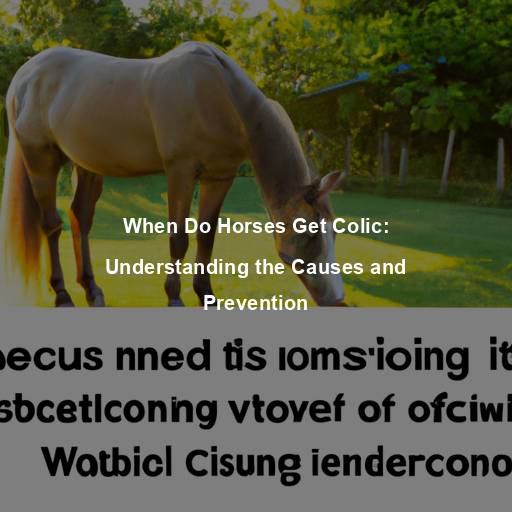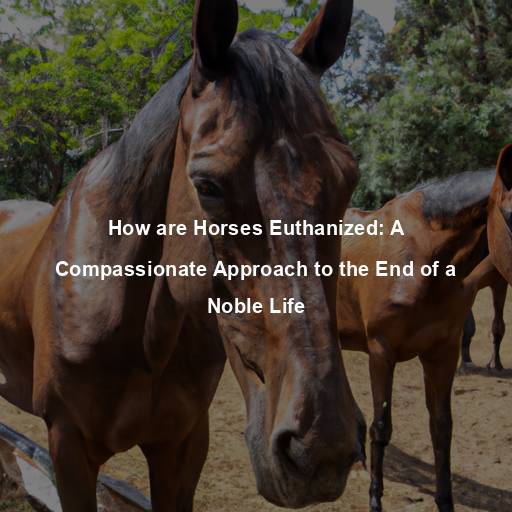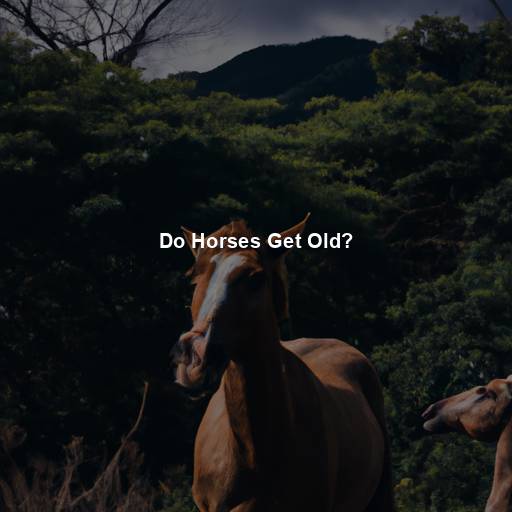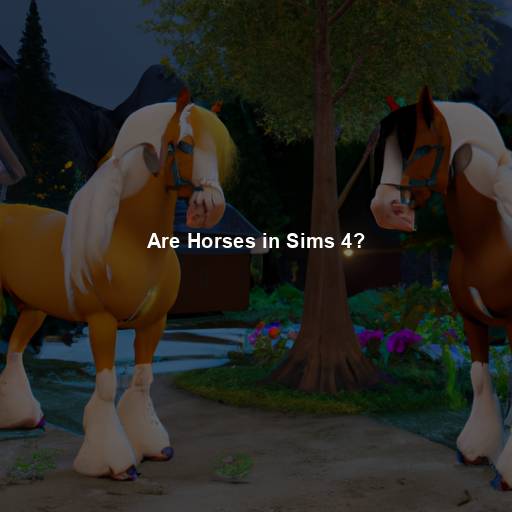When Do Horses Get Colic: Understanding the Causes and Prevention
Last Updated on August 8, 2023 by Evan
Contents
- 1
- 2 Understanding Equine Colic
- 3 Causes of Equine Colic
- 4 Preventing Equine Colic
- 4.1 Maintain a Consistent Feeding Routine
- 4.2 Provide Clean and Fresh Water
- 4.3 Implement Dietary Changes Gradually
- 4.4 Offer Sufficient Roughage
- 4.5 Manage Parasite Control
- 4.6 Maintain Regular Dental Check-ups
- 4.7 Minimize Stress and Environmental Changes
- 4.8 Veterinary Examination
- 4.9 Pain Management
- 4.10 Fluid Therapy
- 4.11 Nasogastric Intubation
- 4.12 Surgical Intervention
- 5 Signs of Colic: When to Call the Vet
- 6 FAQs: When do horses get colic?
- 6.1 What is colic in horses?
- 6.2 How common is colic in horses?
- 6.3 When do horses typically get colic?
- 6.4 Are certain breeds more prone to colic?
- 6.5 Are there specific seasons or weather conditions that increase the likelihood of colic?
- 6.6 Can stress cause colic in horses?
- 6.7 How can I prevent colic in my horse?
- 6.8 What are the signs of colic in horses?
- 6.9 Is colic always a life-threatening condition?
- 6.10 Can horses recover from colic?
As horse owners and enthusiasts, it is our responsibility to ensure the well-being and health of these majestic creatures. One common ailment that can affect horses is colic, a term used to describe abdominal pain. Colic can range from mild discomfort to a life-threatening condition, and it is crucial to understand the causes, symptoms, and preventive measures associated with this condition. In this article, we will delve into the world of equine colic, exploring its various forms, identifying potential triggers, and providing insights on how to prevent this distressing condition.
Understanding Equine Colic
What is Colic?
Colic is not a specific diagnosis but rather a broad term used to describe abdominal pain in horses. It is important to note that colic can have various underlying causes, ranging from gastrointestinal issues to dental problems. Recognizing the signs of colic early on and seeking prompt veterinary attention is vital to ensure a positive outcome for our equine companions.
Types of Colic
There are different types of colic that horses can experience, each with its own set of causes and symptoms. Some common types of colic include:
-
Impaction Colic: This occurs when a blockage forms within the horse’s gastrointestinal tract, resulting in the accumulation of feed material or other substances. Impaction colic can be caused by inadequate hydration, poor quality feed, or a lack of roughage in the diet.
-
Gas Colic: Gas colic is characterized by the accumulation of excess gas in the horse’s digestive system. This can occur due to various factors, such as rapid changes in diet, ingestion of indigestible materials, or a disruption in the normal fermentation process within the gut.
Spasmodic colic, an agonizing condition, derives its existence from the involuntary spasms and contractions that torment the delicate intestinal muscles. Its enigmatic presence arises from a chaotic combination of stress, abrupt dietary alterations, and an assortment of other unpredictable elements that disarray the harmonious workings of the gastrointestinal tract. Like a tempestuous storm that sweeps through without warning, this perplexing malady takes hold without mercy, leaving its sufferers grasping for answers amidst the bewildering maze of causes.
Introducing: Twisted Gut Colic, a treacherous ailment that unveils itself as a dreaded volvulus or torsion within the equine intestines. This perplexing phenomenon transpires when a segment of the horse’s delicate intestinal tract becomes entangled within its own complex labyrinth. Plunging the equine world into a realm of uncertainty, this dire affliction demands swift and decisive action from skilled veterinary professionals to stave off its life-threatening consequences. A foe to be reckoned with, it leaves no room for hesitation or delay.
Identifying Colic in Horses
Recognizing the subtle yet telltale signs of colic can mean the difference between swift intervention and lingering discomfort. From the unpredictable twists and turns of abdominal pain to the bewildering array of symptoms that can range from mild discomfort to excruciating agony, it is crucial to tune in to the subtle cues that your body may be sending. Keep a vigilant eye out for the perplexing combination of restlessness, excessive kicking, or rolling on the ground, as these could be subtle indicators of an impending colic episode. By staying informed and vigilant, you can rise above the perplexing nature of colic and ensure prompt and effective treatment when it matters most.
One common signal that your furry companion might be experiencing discomfort is if they are constantly pawing or kicking at their belly area. This repetitive behavior can indicate a range of underlying issues that may be causing them distress, leaving pet owners puzzled as to what could be the cause. Whether it’s a gastrointestinal problem or an allergic reaction, it’s crucial to consult with a veterinarian to alleviate your pet’s perplexity and ensure their well-being.
Experience the joy of rolling and repeatedly lying down and getting up with this invigorating activity! Whether you’re looking for a new way to keep fit or simply want to unwind, this captivating and ever-changing movement will leave you feeling both refreshed and slightly puzzled, in the best possible way. Embrace the burst of energy as you roll and rise, and let the perplexity of the process add a hint of unpredictable excitement to your daily routine. It’s time to embrace the delightful mystery of this captivating motion and discover the magic it brings to your body and mind.
Have you recently found yourself lacking the usual inclination to indulge in your favorite dishes? Perhaps you’ve noticed a peculiar shift in your eating habits, where the once enticing aroma of a home-cooked meal no longer entices your taste buds. This sudden loss of appetite, accompanied by a perplexing decrease in the desire to consume food, can certainly leave one feeling perplexed and concerned about their overall well-being. If you’re experiencing this bewildering change in your relationship with food, we have some insights and suggestions that might help shed some light on this enigmatic phenomenon.
In a fast-paced world filled with constant stimuli and ever-escalating demands, it’s no wonder that restlessness and agitation have become unwelcome companions for many. The ceaseless hum of deadlines, the unpredictable nature of modern life, and the overwhelming weight of expectations all contribute to this restless state of being. As we navigate through the chaos, seeking a moment of respite, the elusive tranquility seems to slip further away, leaving us in a perpetual state of unease and discontent.
With summer just around the corner, it’s natural to experience some perspiration and a heightened heartbeat. These bodily reactions are often triggered by a combination of factors, such as warmer temperatures, physical exertion, or even stress. While it can be a bit perplexing to encounter these sensations, they are actually signs that our bodies are working properly, regulating our internal temperature and pumping oxygenated blood to our muscles. So, embrace the burst of energy and let your body guide you through this season of activity!
In today’s fast-paced world, many individuals find themselves facing the perplexing issue of irregularity when it comes to their bowel movements. The lack of regularity can leave one feeling quite bursty and at a loss for solutions. It’s crucial to delve deeper into this matter, exploring the potential causes and seeking out expert advice to bring relief to this troubling situation. Don’t let the unpredictability of your digestive system hold you back from enjoying a vibrant and healthy lifestyle.
– Stretching out as if to urinate without producing urine
As we observe the mesmerizing maneuver of this creature, we can’t help but be intrigued by its peculiar behavior of gently pressing upon the sides or playfully nibbling at them. This enigmatic display leaves us in a state of bewilderment and curiosity, urging us to delve deeper into the hidden motives behind such an intriguing act. As our eyes witness this burst of spontaneity and perplexity, we are left to ponder the true meaning behind this enigmatic behavior.
Feeling down and lacking energy? Explore the depths of your emotions and the mysteries of your fatigue with our insightful articles on depression and lethargy. Dive into the complexities of the human mind and discover strategies to navigate these challenging experiences. Uncover the hidden factors that contribute to these states and embrace a renewed sense of vitality and emotional wellbeing.
When it comes to the health of our beloved furry friends, there are certain signs that can really send us into a state of concern. If you happen to notice any of these indications, it is of utmost importance to reach out to your trusted veterinarian without delay. Remember, quick action and timely attention can make all the difference in ensuring the well-being of your cherished pet.
Causes of Equine Colic
When it comes to the enigmatic world of colic in horses, deciphering the cryptic triggers is of utmost importance. Alas, trying to unravel the intricate web of causality can leave even the most astute minds perplexed. However, amidst this enigma, certain factors emerge as potential culprits in unleashing this dreaded condition upon our equine companions. By delving into the precarious realm of colic causation, we equip ourselves with the knowledge to proactively ward off this affliction, grasping at the elusive threads of prevention.
Dietary Factors
The potential risks lurking within a horse’s diet transcend our comprehension, as the delicate equilibrium of their gastrointestinal system trembles under the weight of sudden shifts. The enigmatic dance between their feed and forage, once disrupted, can unravel a cascade of perplexing consequences, plunging the noble creature into the perilous realm of colic. Such is the intricate mystery that unfolds within the equine digestive system, where even the slightest alteration to their sustenance can unleash a tumultuous storm of uncertainty.
Lack of proper hydration can be a real culprit when it comes to impaction colic. Insufficient water intake can suck the moisture right out of the digestive tract, leading to some serious issues. We’ve all heard how important it is to stay hydrated, but it’s easy to overlook just how much it can impact our overall health, especially when it comes to our gut. So, don’t neglect your water intake folks, it’s crucial for a properly functioning digestive system!
When it comes to the health of our equine friends, it’s essential to pay attention to the quality of their feed. Feeding them low-quality forage or feed that may be contaminated with mold or spoilage can lead to an increased and concerning risk of colic. To steer clear of this perplexing situation, it’s crucial to ensure that our horses are provided with high-quality, nutritious food that meets their dietary needs.
Management Practices
- Feeding Schedule: Irregular feeding schedules or long intervals between meals can disrupt the natural digestive process, increasing the chances of colic.
Insufficient availability of roughage, like hay or pasture, can seriously hamper a horse’s digestive system, causing a host of perplexing issues including the dreaded colic. Without access to these essential fibrous foods, a horse’s gut may become perplexed and struggles to function at its best, leaving both the horse and its owner in a state of burstiness. The consequences of this limited access to roughage can leave equestrians grappling with a plethora of confounding digestive problems.
The well-being of our equine companions is undoubtedly a matter of great concern. It has been observed that horses, with all their sensitivity and vulnerability, are significantly impacted by stressful circumstances and unforeseen alterations in their surroundings. These factors, quite perplexingly, have been found to be closely linked to the occurrence of colic, a condition feared by horse owners and caretakers alike. In light of these discoveries, it becomes paramount to delve deeper into understanding how stress and environmental changes play an intricate role in the health and welfare of these majestic creatures.
Parasites and Dental Issues
Unwanted guests lurking within: insidious internal parasites like worms can wreak havoc on the delicate balance of our gastrointestinal system, leaving a trail of inflammation and potential colic in their wake. These elusive intruders have the audacity to invade our bodies, causing perplexity and wreaking havoc on our well-being. So it’s crucial to shield ourselves from their sneaky advances and safeguard our gastrointestinal terrain.
When it comes to our equine friends, dental problems can really throw a wrench in their chewing game. Imagine dealing with sharp points or uneven wear in your teeth – it’s enough to make anyone cringe. Well, the same goes for horses, and these issues can seriously mess with their digestion and up the colic risk. It’s essential to stay on top of their dental health to keep those pearly whites – or should we say, molars – in check.
Preventing Equine Colic
When it comes to that pesky colic issue, no one likes to play dice with their horse’s health. But fear not, there are some nifty moves you can make to keep those gut demons at bay and have your equine companion sailing smoothly through the digestive seas. So buckle up and get ready to dive into some preventive strategies that will make your horse’s tummy purr like a well-oiled machine.
Maintain a Consistent Feeding Routine
Maintaining a structured feeding routine not only aids in balancing the intricate workings of your equine companion’s digestive system, but also minimizes the perplexing specter of colic. Dedicate yourself to nourishing your majestic steed at symmetrical intervals throughout the day, guaranteeing a steady infusion of nourishing forage and sustenance that is of the utmost superiority.
Provide Clean and Fresh Water
Ensure your horse has access to clean and fresh water at all times. Adequate hydration is essential for maintaining a healthy digestive system and preventing impaction colic. In cold weather, consider using heated water buckets to encourage water consumption.
Implement Dietary Changes Gradually
When it comes to introducing new feeds or making adjustments to your beloved horse’s diet, it’s important to prioritize gradual transitions over sudden changes. The tender equilibrium of their digestive system can easily be disrupted by abrupt dietary shifts, potentially leading to the perplexing and concerning issue of colic. Take the time to navigate this transition period smoothly, allowing your horse’s body to adapt and avoid unnecessary bursts of discomfort.
Offer Sufficient Roughage
Provide your horse with ample access to quality roughage, such as hay or pasture. Roughage plays a crucial role in maintaining proper gut function and preventing colic.
Manage Parasite Control
Develop a strategic deworming program in consultation with your veterinarian to control internal parasites. Regular fecal exams and targeted deworming help minimize the risk of parasite-related colic.
Maintain Regular Dental Check-ups
Make sure to mark your calendars for regular dental check-ups and the occasional tooth floating session for your beloved equine companion. Trust us, maintaining optimal oral health is key to promoting efficient mastication and digestion, greatly minimizing the risks of colic caused by dental complications. Stay a step ahead and keep those pearly whites in impeccable shape!
Minimize Stress and Environmental Changes
Horses thrive in a familiar and stable environment. Minimize stressful situations and gradual changes to their surroundings to reduce the risk of colic caused by stress or abrupt environmental changes.
Veterinary Examination
Spotting signs of colic in your horse can be an anxious ordeal, but don’t panic, help is at hand! Contacting your trusted veterinarian should be your immediate instinct, as they possess the expertise needed to unravel the perplexing mysteries behind the condition. Prepare for a thorough examination, where they will don their detective’s hat and dive deep into the horse’s well-being, untangling the enigma of the underlying cause. Brace yourself, as they may prescribe additional diagnostic tests that work like puzzle pieces, such as blood work, ultrasounds, or even a meticulous rectal examination, all vital in piecing together the colic puzzle.
Pain Management
When it comes to addressing colic in horses, the pain factor cannot be overlooked. In order to bring relief to our equine friends, veterinarians adopt a strategic approach that often involves the administration of medications like analgesics and anti-inflammatories. By alleviating discomfort and tackling inflammation in the gastrointestinal tract, these interventions pave the way for relief. Remember, the key lies in closely following your veterinarian’s guidance, especially when it comes to dosage and proper administration of these medications.
Fluid Therapy
Fluid therapy plays a vital role in the treatment of colic, especially in cases of impaction or dehydration. Intravenous or oral fluids may be administered to rehydrate the horse and restore electrolyte balance. Your veterinarian will determine the appropriate fluid therapy regimen based on the horse’s condition and specific needs.
Nasogastric Intubation
In some cases, nasogastric intubation may be necessary to relieve gas or remove impactions. This procedure involves passing a tube through the horse’s nostril and into the stomach to release excess gas or administer fluids. Nasogastric intubation should only be performed by a veterinarian or trained professional to avoid complications.
Surgical Intervention
When colic takes a turn for the worse, sometimes surgery becomes the only option to save the day. This typically comes into play when the gut decides to play a deadly game of Twister (also known as volvulus), or when other alarming conditions rear their perplexing heads. In these cases, surgery swoops in, like a hero in a white coat, aiming to unravel the tangled mess, restore intestinal harmony, and put a stop to any future complications. Of course, it’s important to keep in mind that plunging into the world of scalpels and sutures isn’t without its own set of risks, so it’s crucial to have a heart-to-heart with your trusted veterinarian before making any bold moves.
Signs of Colic: When to Call the Vet
Timely veterinary care is absolutely essential when it comes to managing the perplexing condition of colic. Although a few cases of mild colic might mysteriously resolve themselves, it’s best not to leave anything to chance. Keep an eye out for baffling signs that unquestionably demand urgent veterinary intervention:
Severe Pain
If your horse exhibits severe signs of pain, such as violent rolling, thrashing, or attempts to throw themselves, it is essential to call your veterinarian immediately. These signs may indicate a serious condition that requires urgent intervention.
Lack of Gut Sounds
If you listen to your horse’s abdomen using a stethoscope and hear little to no gut sounds, it could indicate an obstruction or impaction. This is a significant red flag that requires veterinary attention.
Unproductive Attempts to Urinate or Defecate
Have you ever noticed your beloved equine companion exhibiting signs of discomfort while attempting to relieve itself? Well, buckle up because it could be a possible red flag for colic. Colic, addressing potential roadblocks within the urinary or gastrointestinal system, could be the culprit behind this perplexing situation. How intriguing and disconcerting at the same time!
Persistent Symptoms
If your horse exhibits colic symptoms that persist for more than 30 minutes to an hour, it is crucial to contact your veterinarian. Colic can worsen rapidly, and early intervention is key for a successful outcome.
Abnormal Vital Signs
Signs such as an elevated heart rate, abnormal respiratory rate, pale or blue gums, or cold extremities may indicate a severe case of colic. These symptoms warrant immediate veterinary attention.
When it comes to colic, it’s important to prioritize safety above all else. Trusting your gut and seeking advice from a veterinarian should any concerns arise is essential in maintaining your horse’s well-being. Remember, it’s better to err on the side of caution than to regret not taking action when it matters most. Keep a watchful eye on your horse and take proactive measures to ensure their health and happiness.
FAQs: When do horses get colic?
What is colic in horses?
In the equine world, the enigmatic and enigmatic condition called colic shrouds the equine kingdom with a flurry of perplexity. This enigmatic ailment entails a puzzling dance of abdominal pain, leaving horse owners and veterinarians alike in a state of bewilderment. Colic, an enigmatic and multi-faceted labyrinth of discomfort, is a cryptic puzzle that demands astute attention and can conceivably range from a mere whisper of unease to an ominous specter of looming peril.
How common is colic in horses?
Colic, a perplexing and oftentimes distressing condition, seems to have found its way into the lives of our equine companions, with studies indicating that roughly 10-11% of horses will encounter this enigmatic ailment at one juncture or another. Regardless of their age, breed, or involvement in various equestrian disciplines, these majestic creatures remain susceptible to the unyielding grip of colic’s capricious nature. As horse owners navigate through the labyrinth of equine health, they must confront the enigma of colic head-on, armed with knowledge and vigilance.
When do horses typically get colic?
Colic, the enigmatic foe that strikes horses unexpectedly, is a perplexing ailment that can arise at any moment. While its origins remain shrouded in mystery, certain triggers have been identified that can heighten the risk. Beware the treacherous dance of dietary modifications, the sudden indulgence in excessive grains, the whispered thirst left unquenched, the capricious whims of weather, the stress-laden moments horses endure, and the deprivation of rightful exercise. Amidst this tapestry of uncertainty, colic lurks, ready to entangle our equine companions in its bewildering grip.
Are certain breeds more prone to colic?
There is no specific breed that is more prone to colic. However, certain management practices related to certain breeds, such as feeding or exercise routines, may increase the risk of developing colic.
Are there specific seasons or weather conditions that increase the likelihood of colic?
The ever-changing weather patterns, with their whimsical shifts in temperature and barometric pressure, have long been suspected of playing a perplexing role in the emergence of colic among our equine friends. While this theory holds some truth, it is worth noting that colic, that unpredictable and enigmatic ailment, can rear its head in any season, defying the boundaries of weather conditions. Thus, it seems that colic, in all its mysterious nature, refuses to be tamed by the mercurial hands of Mother Nature.
Can stress cause colic in horses?
It’s no secret that stress can really take a toll on our equine friends, and when it comes to colic, it seems to be more than just a coincidence. Whether it’s the dreaded transport, a sudden shift in their familiar surroundings, a jarring change in routine, overcrowding, or even some unexpected social drama, horses are definitely not immune to the perplexing effects of stress. And when stress strikes, colic can sneak up on them, causing further unease, discomfort, and uncertainty. So it’s essential for horse owners and caretakers to be aware of the burst of stress-inducing factors that could potentially lead their beloved steeds down the bumpy road of colic.
How can I prevent colic in my horse?
While it may not be possible to completely prevent colic, there are certain management practices that can help reduce the risk. These include providing a consistent and balanced diet, ensuring access to fresh water at all times, avoiding sudden changes in diet or exercise, maintaining a regular deworming program, and minimizing stressors when possible.
What are the signs of colic in horses?
Colic in horses is a perplexing condition characterized by a flurry of unpredictable symptoms. From bouts of abdominal pain to restless pacing and excessive sweating, these enigmatic signs can leave any horse owner in a state of bewilderment. Alongside these perplexing behaviors, horses may also exhibit a loss of appetite, an absence of bowel movements, and unusual alterations in their behavior. Therefore, promptly reaching out to a qualified veterinarian becomes imperative in unraveling this mysterious ailment and ensuring your horse’s well-being.
Is colic always a life-threatening condition?
Colic can range from mild and transient cases to severe and life-threatening situations. It is crucial to take colic seriously and consult a veterinarian promptly, as the sooner the issue is addressed, the higher the chances of successful treatment.
Can horses recover from colic?
Though colic in horses may cause great concern and uncertainty, it is important to note that many equines do find their way back to health with the right medical intervention and management. The final outcome hinges on various factors, including the underlying cause and the severity of the colic episode, as well as the swiftness with which veterinary attention is sought. So, while this condition may initially feel perplexing, it is comforting to know that there is hope for recovery for our beloved four-legged friends.







